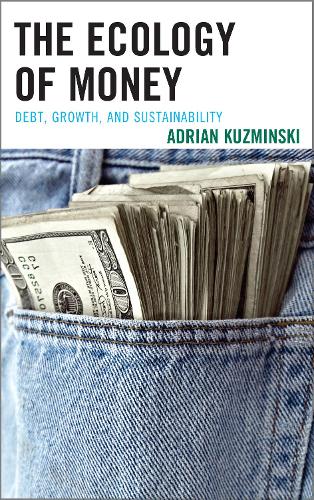
The Ecology of Money: Debt, Growth, and Sustainability
(Paperback)
Publishing Details
The Ecology of Money: Debt, Growth, and Sustainability
By (Author) Adrian Kuzminski
Bloomsbury Publishing PLC
Lexington Books
26th February 2015
United States
Classifications
Professional and Scholarly
Non Fiction
Central / national / federal government policies
332.4
Physical Properties
Paperback
152
Width 154mm, Height 226mm, Spine 13mm
236g
Description
Modern economies must "grow" because money borrowed for investment can be repaid only by expanding production and consumption to meet the burden of usurious rates of interest. The roots of this dynamic between debt and growth lay in the financial revolution of the late seventeenth and early eighteenth centuries in Britain which established a new usurious monetary system. For the first time in history credit was made widely available, but only on condition of an exponentially increasing debt burden. To pay back debts production had to increase correspondingly, leading to the industrial revolution, economic "growth", and modernity itself. Though private creditors gained a monopoly over the creation of credit, and were disproportionately enriched, the resulting economic growth for a time was great enough to benefit most debtors as well as creditors, ensuring widespread prosperity. That is no longer the case. With today's eco-crisis we have reached the limits of growth. We no longer have the natural resources to grow fast enough to pay our debts. This is the real root of our current financial crisis. If we are to live sustainably, our system of money and credit must be transformed. We need a non-usurious monetary system appropriate to a steady-state economy, with capital broadly distributed at non-usurious rates of interest. Such a system was developed by an early nineteenth century American thinker, Edward Kellogg, and is explored here in depth. His work inspired the populist movement and remains more relevant than ever as a viable alternative to the a financial system we can no longer afford.
Reviews
Money makes the world go round, and yet remains a mystifying topic for most. Fortunately, Adrian Kuzminski's new and authoritative book clears up our cultural confusion about money and explains how our economic and ecological lives are deeply intertwined. Read this bookour planet's future may depend on it. -- Rob Williams, professor of history, Champlain College, publisher of the Vermont Commons
We've got three intertwined problems of increasing wealth inequality, a stagnant labor market, and fraying ecological fabric. If we're going to get a handle on them, we need to rethink how our credit system works. Kuzminski provides a provocative history of how we got the system we have, and an interesting look at an alternative we might consider. -- Karl Seeley, professor of economics, Hartwick College
Author Bio
Adrian Kuzminski is an author and Research Scholar in Philosophy at Hartwick College. His previous works include Fixing the System: A History of Populism, Ancient and Modern (Continuum, 2008); Pyrrhonism: How the Ancient Greeks Reinvented Buddhism (Lexington, 2008); and The Soul (Peter Lang, 1994). He is also Founder and Moderator of Sustainable Otsego, a social network of several hundred subscribers in the Cooperstown, NY, area, focused on promoting sustainable practices.
